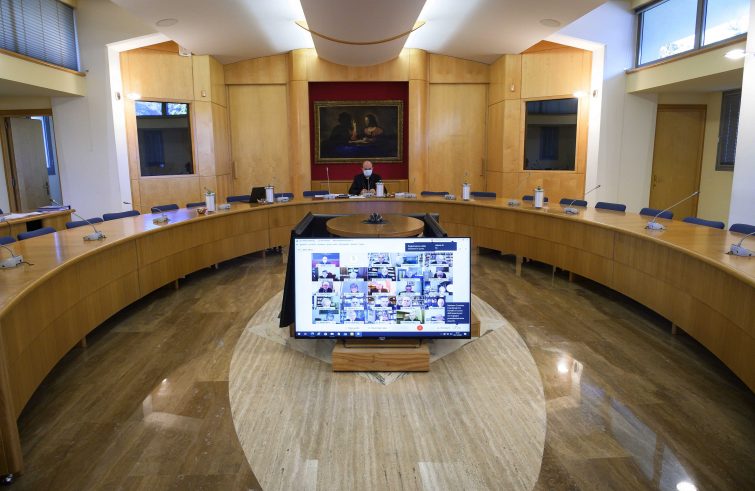
“We express our sorrow and closeness to the victims of the attacks, to their families, to the shepherds, to the faithful, to the French and Austrian peoples”, said Msgr. Mario Meini, bishop of Fiesole and Vice-President of the Italian Episcopal Conference, on behalf of the Italian Church, in the opening remarks of the extraordinary session of the Permanent Council of bishops, held in live streaming. “Nice, Lyon and Vienna: in the last few days we have come to relive the tragedy of the fierce violence of those seeking to undermine the foundations of our sense of belonging and of our faith”, said the Vice-President of the Italian Bishops’ Conference (CEI). “This resurgence of atrocities is worming its way throughout Europe and we cannot ignore it: neither as members of the Catholic community, nor as citizens of a democratic society.”
“We firmly condemn the culture of hatred and radicalism that uses religion as a pretext to undermine the fabric of society through violence, including through anti-Christianity and anti-Semitism,
the warning of the Italian bishops: “We trust that the hatred of few will not dissipate the noble wealth of fraternal cooperation involving a large majority of people belonging to many different faiths, evidenced in the bereavement of our Muslim brothers before the tragic events in France and Austria.”
On the subject of the next General Assembly, to be held next November 16 to 19, Msgr. Meini remarked: “The present circumstances strongly prevail and we are once again confronted with a situation that is shattering our plans, requiring a further evaluation of the situation and its developments.”
“In this moment our thoughts go to our Cardinal President, hospitalized with Covid-19 at the Santa Maria della Misericordia Hospital in Perugia”,
said the bishop. “His Eminence extends his greetings to us all, expressing his regret for being unable to participate,” he continued, quoting from Cardinal Bassetti’s message: ” This is a moment of sorrow for many! Over the past months I experienced the fatigue and tiredness of unprecedented times that are affecting the whole of humanity. And nonetheless and in spite of everything, the works of the beauty of the Mystery that becomes gift are constantly unfolding. Even when there seems to be no hope, a glimmer of light illuminates the way.” Italian bishops conveyed their “gratitude” to the Holy Father for the appointment of six new Italian cardinals – Msgr. Marcello Semeraro, Msgr. Augusto Paolo Lojudice, Friar Mauro Gambetti, Msgr. Silvano M. Tomasi, Friar Raniero Cantalamessa and Msgr. Enrico Feroci – who will receive their red hats in the Consistory of November 28: “We pray for them and entrust to the Lord the service they will perform for the universal Church. This choice honours our Churches and binds us to continue our journey in the footsteps of the Gospel”, said Msgr. Meini.
“The pandemic is rapidly spreading and our everyday life seems to be caught in a suffocating grip by its tentacles”,
the analysis of the ongoing health crisis: “Even our Churches, integrated into local social fabric, are confronted with this challenging reality”. “We are seeing once again that opportunities for encounter – at work, at school, in the parish, in the neighbourhood… – which, under normal conditions, shape the days of each person, are starting to diminish throughout the country,” the bishop noted: “As a precautionary measure, educational and pastoral activities in our communities are also changing, testifying to a strong and noteworthy sense of responsibility for everyone’s health. Interpersonal and community relations are precious, but just as important, indeed vital at this stage, is an attitude of utmost prudence in our meetings and public gatherings”.
As a result of the ongoing health crisis caused by the Covid-19 pandemic, “a severe economic recession is expected in Italy, a fertile ground for the growth of new forms of poverty”,
is the cry of alarm of the Italian Bishops’ Conference, on the basis of the recent Caritas Report.
“The incidence of new poor rose from 31% to 45%: almost one person in two turned to Caritas for the first time. Specifically, greater difficulties are experienced by families with minors, women, young people – representing the majority of Italians (52% compared to 47.9% last year) and working age population. The elderly are forced into an increasingly isolated loneliness.” According to data published by the Bank of Italy, “in the months of April and May, the crisis led to reduced revenue for 50% of Italian households, despite support measures.” On top of this, “the issue of employment is connected with the suffering experienced by all those categories of workers forced to make great sacrifices, by numerous retailers and self-employed workers, by the entertainment and cultural sectors”, pointed out Msgr. Meini, who recalled that “our Churches have never stopped ensuring their closeness with dedicated relief.”










